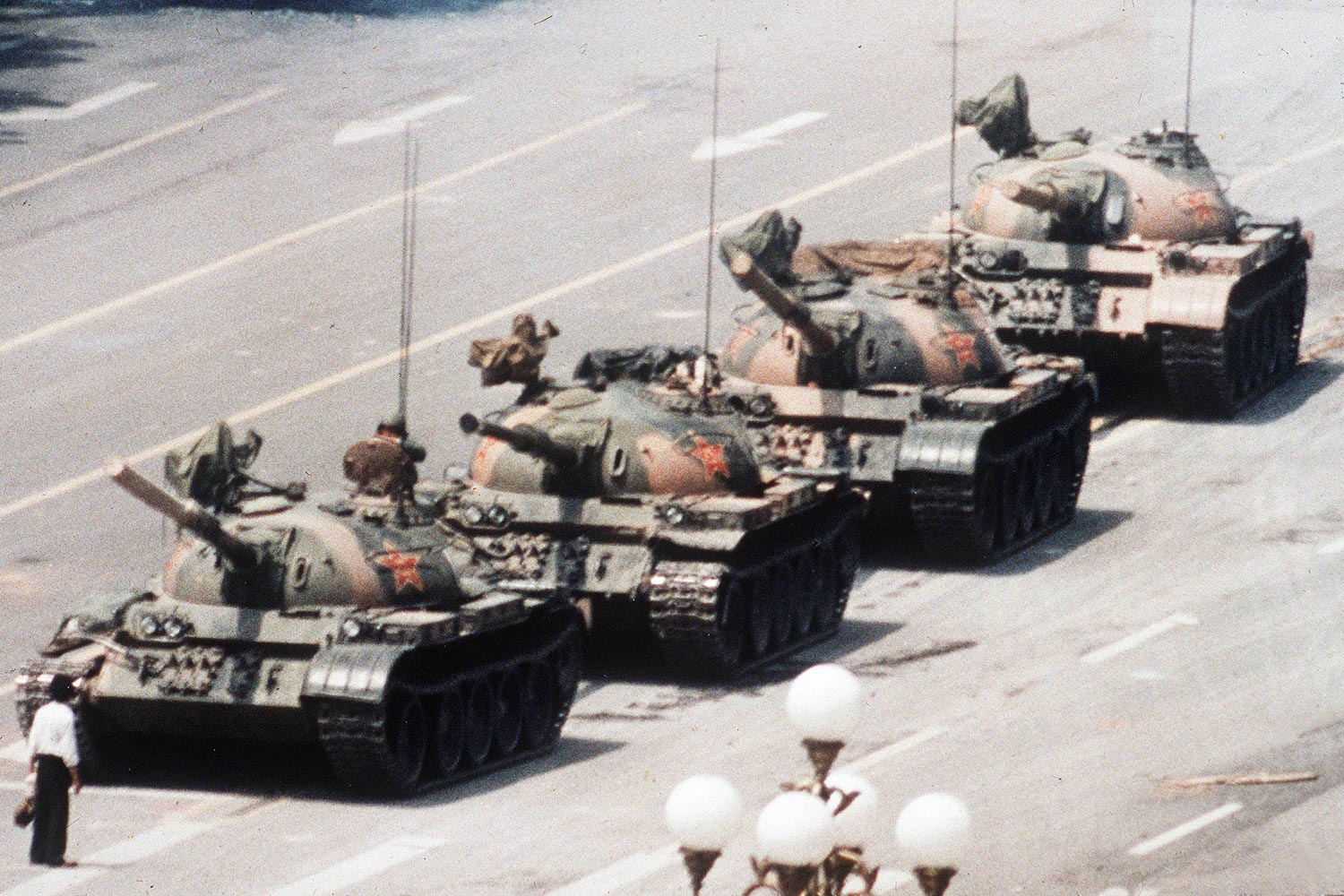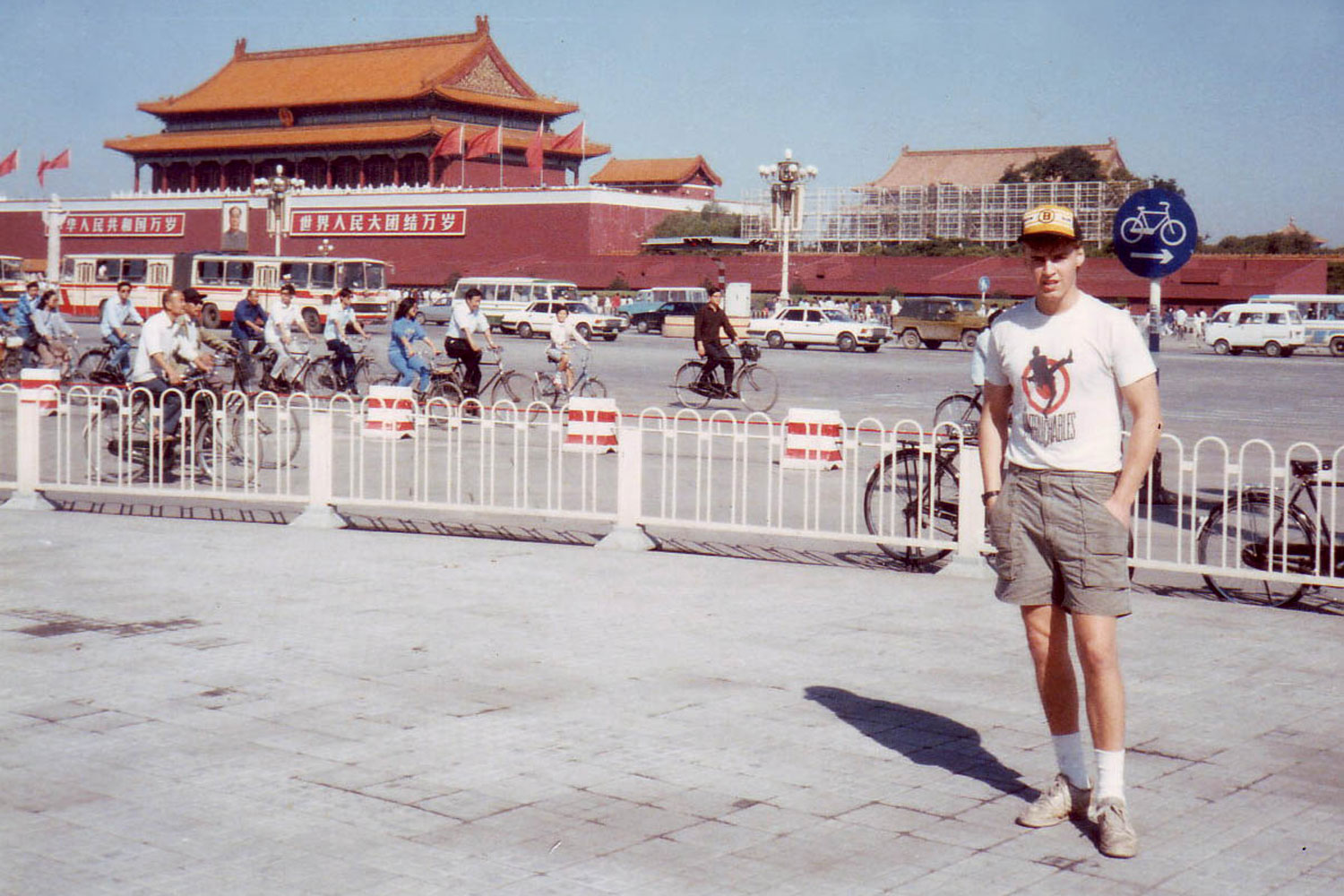
Almost 25 years ago, Jeff Widener ran out of film during the most important assignment of his life.
The brutal crackdown at Tiananmen Square was underway and Widener, a photographer for the Associated Press, was sent to the square to capture the scene. “I rode a bicycle to the Beijing Hotel,” Widener says. “Upon my arrival, I had to get past several Chinese security police in the lobby. If they stopped and searched me, they would have found all my gear and film hidden in my clothes.” But there, in the shadows of the hotel entrance, he saw a long-haired college kid wearing a dirty Rambo t-shirt, shorts and sandals. “I yelled out, ‘Hi Joe! Where you been?’ and then whispered that I was from AP.” Widener remembers. He asked to go to the young man’s room. “He picked up on it,” says Widener, “and out of the corner of my eye I could see the approaching security men turn away, thinking I was a hotel guest.”
The young man was an American. His name was Kirk Martsen.
Martsen told Widener that he was lucky to arrive when he did. Just a few minutes earlier, some hotel guests had been shot by a passing military truck full of Chinese soldiers. Martsen said hotel staff members had dragged the bodies back in the hotel and that he had barely escaped with his life. From a hotel balcony, Widener was able to take pictures with a long lens—but then he ran out of film. So he sent Martsen on a desperate hunt for more, and Martsen returned with one single roll of Fuji color negative. It was on this film that Widener captured one of the most iconic images in history, the lone protester facing down a row of Chinese tanks.
“After I made the image, I asked Kirk if he could smuggle my film out of the hotel on his bicycle to the AP office at the Diplomatic Compound,” Widener says. “He agreed to do this for me as I had to stay in the hotel and wait for more supplies and could not risk being found out. I watched Kirk from my balcony, which was right over the area where the security was. In what seemed to be an eternity, Kirk unlocked his bike and started to pedal off, although a bit awkwardly because all my film was stashed in his underwear. Five hours later, a call to Mark Avery at the AP office in Beijing confirmed that the film had arrived and been transmitted world-wide. What I did not know until 20 years later was what actually transpired after Kirk pedaled the bicycle away.”
On the 20th anniversary of Tiananmen Square, I wrote an article detailing each story behind the four different versions of the iconic scene on the Lens blog of the New York Times. At the time of publication, Widener wasn’t sure if the young man’s name was Kirk or Kurt. Soon after, Widener says, that changed: “I was on the computer and that familiar ‘You’ve Got Mail’ rang out on AOL. I could not believe who it was from. After 20 years, Kirk had found me because of the article in the New York Times.”
Widener discovered that Martsen encountered gunfire and more soldiers after he left with the precious film and that he became lost trying to navigate back streets to find the Associated Press office. Martsen went to the U.S. embassy and handed over the film to a U.S. Marine at the entrance, and told the embassy to forward the film to the AP office.
“Kirk risked his life,” Widener says. “If not for all of his efforts, my pictures may never have been seen.”
The next day, the image appeared on the front pages of newspapers around the world.
Years later, the BBC flew Widener back to China to revisit the Square where he made the iconic photo. While walking down Changan Avenue toward the square, Widener met a German teacher sitting on the sidewalk smoking. Widener introduced himself and they had lunch. They were married in July 2010. “If anyone had told me that I would return from that bullet-riddled street 20 years later to meet my future wife, I would have thought them nuts,” Widener says. “Fate has a strange sense of humor.”
Jeff Widener is an award-winning American photographer. See more of his work here.


More Must-Reads from TIME
- Breaking Down the 2024 Election Calendar
- How Nayib Bukele’s ‘Iron Fist’ Has Transformed El Salvador
- What if Ultra-Processed Foods Aren’t as Bad as You Think?
- How Ukraine Beat Russia in the Battle of the Black Sea
- Long COVID Looks Different in Kids
- How Project 2025 Would Jeopardize Americans’ Health
- What a $129 Frying Pan Says About America’s Eating Habits
- The 32 Most Anticipated Books of Fall 2024
Contact us at letters@time.com